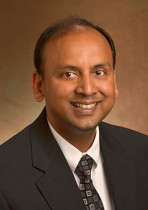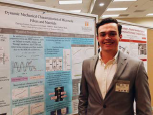 Three undergraduate students from the College of Engineering (CEE and MABE) and the College of Arts and Sciences (Math and Physics major) Sean Lee, Darren Foster, and James Eun were selected from 4,000 entrants to represent the Institute for Advanced Composites Manufacturing Innovation (IACMI) at this year’s National Conference on Undergraduate Research (NCUR). The IACMI is a Manufacturing USA institute that works to support advanced composite technology and grow capital investment and manufacturing jobs in the U.S. composites market. The students conducted research under the guidance of Professor Dayakar Penumadu, the Characterization Fellow for IACMI Materials and Processing directorate and holds the Fred N. Peebles Professorship in the CEE department at UT and one of his post-doctoral scholars, Dr. Stephen Young.
Three undergraduate students from the College of Engineering (CEE and MABE) and the College of Arts and Sciences (Math and Physics major) Sean Lee, Darren Foster, and James Eun were selected from 4,000 entrants to represent the Institute for Advanced Composites Manufacturing Innovation (IACMI) at this year’s National Conference on Undergraduate Research (NCUR). The IACMI is a Manufacturing USA institute that works to support advanced composite technology and grow capital investment and manufacturing jobs in the U.S. composites market. The students conducted research under the guidance of Professor Dayakar Penumadu, the Characterization Fellow for IACMI Materials and Processing directorate and holds the Fred N. Peebles Professorship in the CEE department at UT and one of his post-doctoral scholars, Dr. Stephen Young.
 Darren Foster presented research on the mechanical characterization of micro-scale fibers and thin films, a nano-tensile system to obtain structure-process-property relationships, which advances efforts to more accurately characterize properties of one-dimensional fiber-based functional materials.
Darren Foster presented research on the mechanical characterization of micro-scale fibers and thin films, a nano-tensile system to obtain structure-process-property relationships, which advances efforts to more accurately characterize properties of one-dimensional fiber-based functional materials.
 Sean Lee presented his research on interfacial shear strength of carbon fiber composites. His research is presently focused on utilizing this technique for obtaining precise mechanical properties of carbon fiber interphase.
Sean Lee presented his research on interfacial shear strength of carbon fiber composites. His research is presently focused on utilizing this technique for obtaining precise mechanical properties of carbon fiber interphase.
James Eun, a physics and math major, in collaboration with IACMI M&P post-doctoral fellow Stephen Young, presented  on the development of lamin
on the development of lamin ography, a non-destructive method similar to computed tomography where 2-D projections are collected over an angular range using X-rays. Their research explores the extremely useful information obtained from laminography for relating the visual 3-D features and developing predictive relationships.
ography, a non-destructive method similar to computed tomography where 2-D projections are collected over an angular range using X-rays. Their research explores the extremely useful information obtained from laminography for relating the visual 3-D features and developing predictive relationships.
“It is essential to engage undergraduate students in research and knowledge creation in the areas of science and engineering that are highly relevant to the future needs of the country and share with them the excitement of working with highly trained graduate students, technical staff and post-docs,” said Professor Penumadu. “It gives them important skills, exposure to multi-disciplinary approach for problem solving, importance of technical depth in a focus area of research, confidence to interact with diverse colleagues, and effective communication skills. This is the mission of a research-focused land grant institution and is the unique opportunity our faculty offer at the University of Tennessee that no other teaching based institutions can provide.”